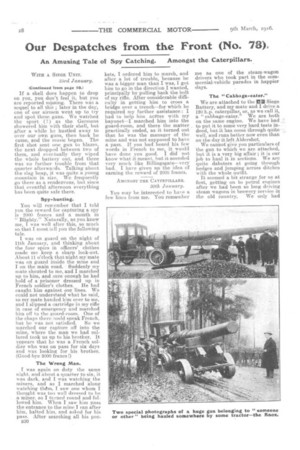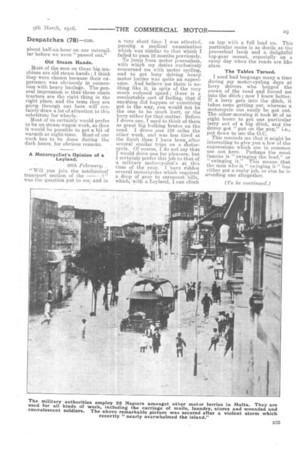Our Despatches from the Front (Non 78).
Page 8

Page 9

If you've noticed an error in this article please click here to report it so we can fix it.
An Amusing Tale of Spy Catching. Amongst the Caterpillars.
WITS A SIEGE UNIT.
23rd January.
(Continued 'from page 10.)
If a shell does happen to drop on you, you don't feel it, but. you are reported missing. There was a sequel to all this ; later in the day, one Of our airmen went up to try and spot these guns. We watched the sport (? ) as the Germans showered him with their shell, but after a while he hustled away to "over our own guns, then back he came, and the music began. The first shot sent one gun to blazes, the next dropped between two of them, and eventually they wiped the whole battery out, and there was no further trouble from that quarter afterwards. Talking about the slag heap, it was quite a young mountain in size. We frequently go there as a rendezvous, but since that eventful afternoon everything has been quite safe there.
Spy-hunting.
You will remember that I told you the reward for capturing a spy is 2000 francs and a month in "Blighty." Naturally, as you know me, I was well after this, so much so that I must tell you the following tale.
I was on guard on the night of 11th January, and thinking about the four spies in officers' clothes made me keep a sharp look-out. About 11 o'clock that night my mate was on guard inside the mine and I on themain road. Suddenly my mate shouted to me, and I marched up to him, and sure enough he had hold of a prisoner dressed up in French soldier's clothes. He had caught him against our lines. We could not understand what be said, so my mate handed him over to me, and I slipped a cartridge in my rifle in case of emergency and marched him off to the guard-room. One of the chaps there .1 wild speak French, hut he was not satisfied. So we marched our capture off into the mine, where the man we had colhired took us up to his brother. It appears that he was a French soldier who was on pass for six days and was looking for his brother. (Good-bye 2000 francs!) The Wrong Man.
T. was again on duty the same night, and about a quarter to six, it was dark, and I was watching the miners, and as I marched along watching thdin, I saw one whom I thought was too well dressed to be a miner, so I turned round and followed him. When I saw him pass the entrance to the mine I ran after him, halted him, and asked for his pass. After searching all his poc
kets, I ordered him to march, and after a lot of trouble, 'because he was a bigger man than I was, I got him to go in the direction I wanted, principally by pulling back the bolt of my rifle. After considerable difficulty in getting him to cross a bridge over a trench—for which he required my further assistance : I had to help him aciross with my bayonet—I marched him into the guard-room, and there the matter practically ended, as it turned out that he was the manager of the mine and was not supposed to have a pass. If you had heard his few words in French to me, it would have done you good. I did not know what it meant. but it sounded very much like Billingsgate—very bad. I have given up the idea of earning the reward of 2000 francs.
AMONGST Tax CATERPILLARS.
30th January.
You may be interested to have a few lines from me. You remember me as one of the steam-wagon drivers who took part in the commercial-vehicle parades in happier days.
The "Cabbage-eater." We are attached to the In Siege Battery, and my mate and I drive a 120 li.p. caterpillar, or, as we call it, a "cabbage-eater." We are both on the same engine. We have had to put it to some very hard tests indeed, but it has come 'through quite • well, and runs better now even than on the day it left Aldershot. We cannot" give you particulars of the gnu to which we are attached, but it is a very big affair ; it is our job to haul it in sections. We are quite dabsters at going through hedges and jumping across ditches with the whole outfit.
It seemed a bit strange for us at first, getting on to petrol engines after we had been so long driving steam wagons in brewery service in the old country. We only had about half-an-hour on our caterpillar before we were " passed out.'
Old Steam Hands.
Most of the men on these big machines are old steam hands ; I think they were chosen because their experience was obviously in connection with heavy haulage. The general impression is that-•these chain tractors are the right thing in the right place, and the tests they are going through out here will certainly draw a lot of attention to this substitute for wheels.
Most of us certainly would prefer to be on steam-wagon work, as then it would be possible to get a bit of warmth at night-time. Most of our work has to be done during the
dark hours, for obvious reasons. • A Motorcyclist's Opinion of a Leyland.
28th Februor2f.
"Will you join the media/heal transport section of the ? " was the question put to me, and in
a very short time I was attested, passing a medical examination which was siinilar to that which I failed to pass 12 months previously. To jump from motor journalism, with which ray duties exclusively concerned me with motor cycling, and to get busy driving heavy motor lorries was quite an experience. And believe me there is nothing like it, in spite of the very much reduced speed ; there is a comfortable sort Of feeling, that if anything did happen or something got la the way, you would not be the one to be much hurt, or the lorry either for that matter. Before I drove one, I used to think of them as great big hulking brutes on the road. I drove .one 160 miles the other week, and was less tired at the finish than I have been after several similar trips on a iliotorcycle. Of course, I do not say that I would drive one for pleasure, but I certainly prefer this job to that of amilitary motorcyclist's at this time of the year. I have ridden several motorcycles which required a drop of gear to surmount bills, which, -With a Leyland, I can climb
on top with a full load on. This particular make is as docile as the proverbial lamb and a delightful top-gear mount, especially on a rainy day when the roads are like glass.
The Tables Turned.
I used bad language many a time during my motor-cycling days at lorry drivers who hogged the crown of the road and forced me into the ditch ; now I know better. If a lorry gets into the ditch, it takes some getting out, whereas a motorcycle can easily be got out. The other morning it took 20 of us eight hours to get one particular lorry out of a big ditch, and the driver got "put on the peg," i.e., put down to see the O.C.
This reminds me that it might be interesting to give you a few of the expressions which are in common use out here. Perhaps the most famous is "swinging the lead," or "swinging it." This means that the man who is "swinging it" has either got a cushy job, or else he is avoiding one altogether.






















